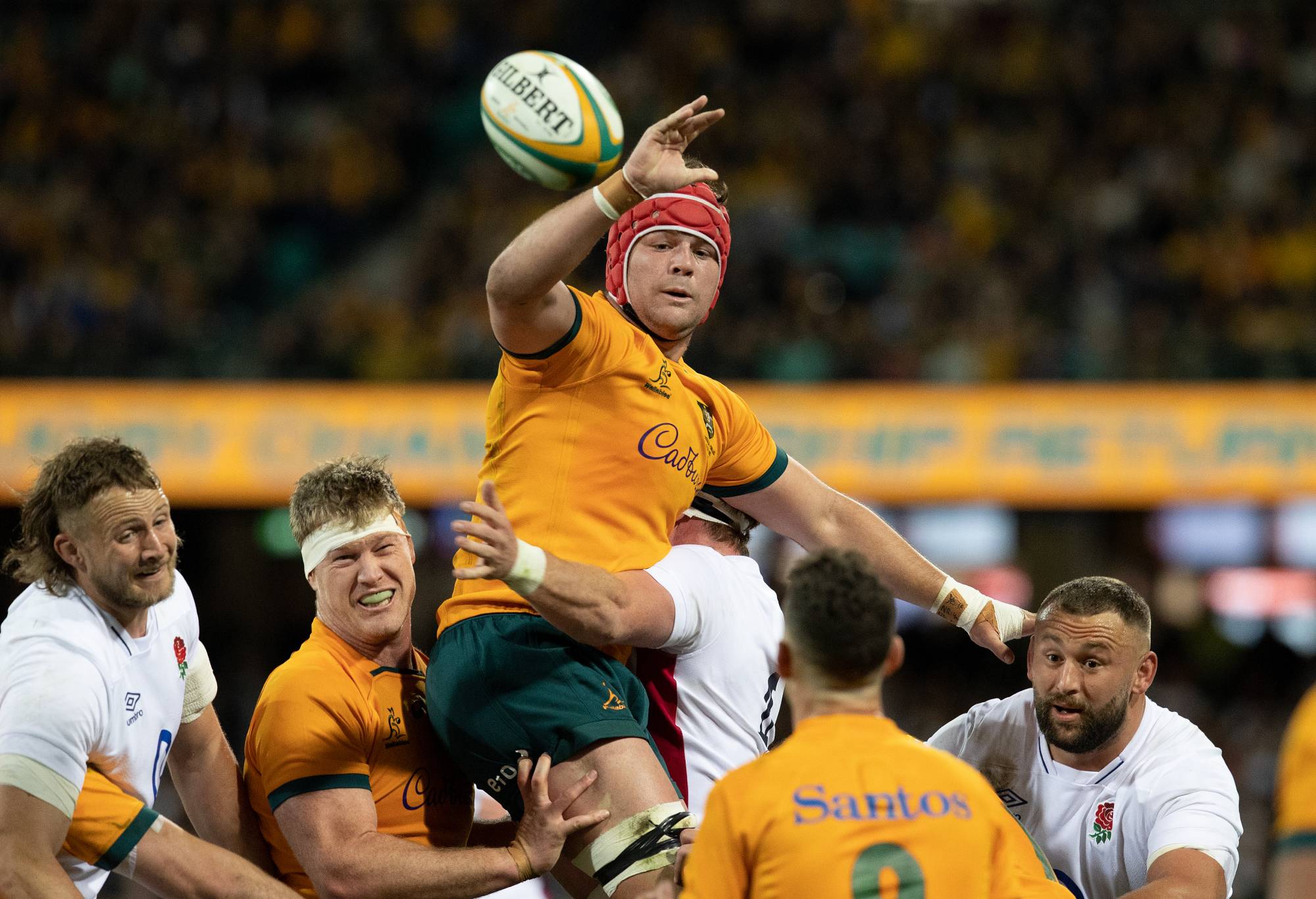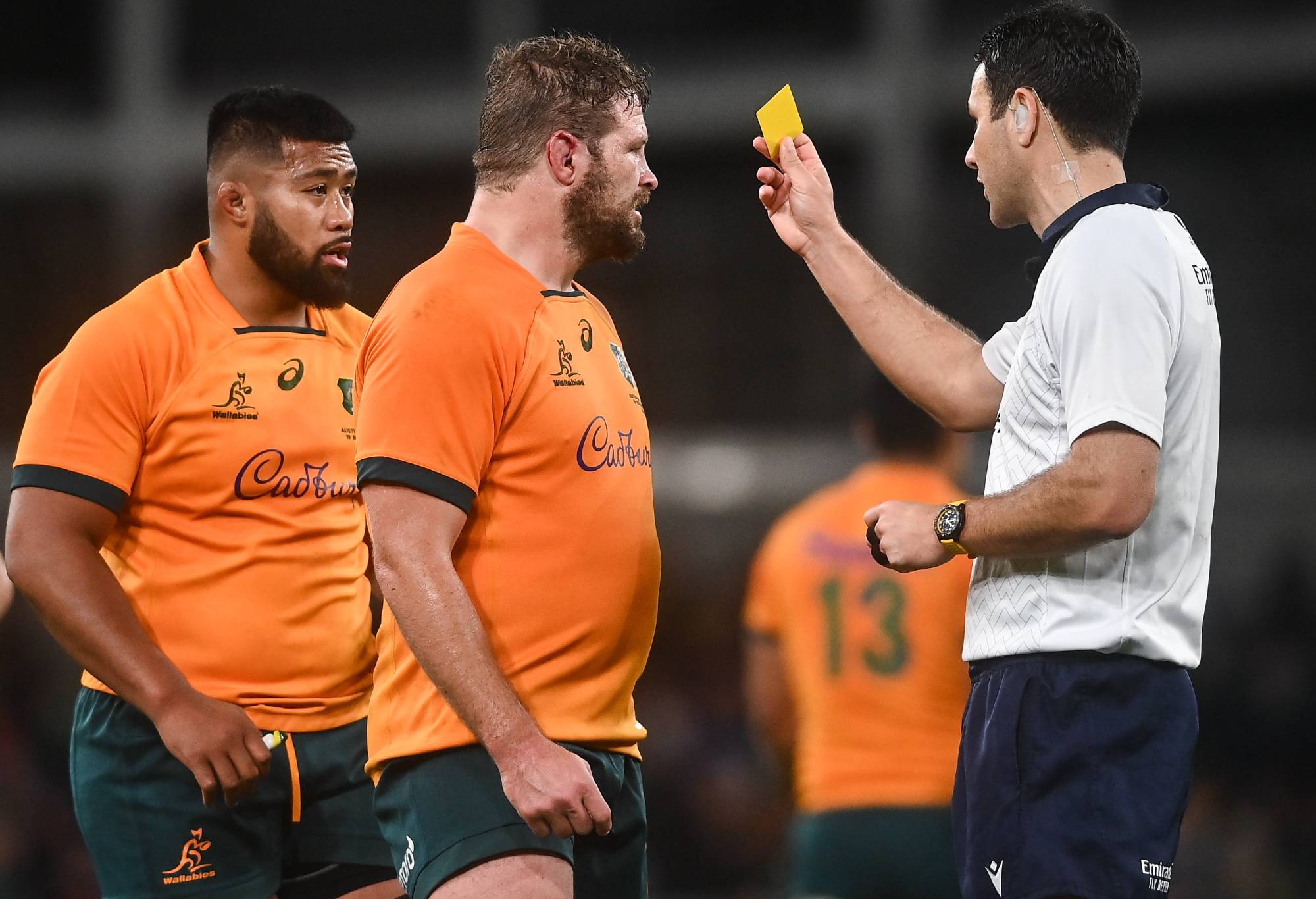
[ad_1]
What’s the easiest way for Australia to beat England in a rugby union match in London? Make England play many of the rugby, take in the stress, cease assaults at supply, gradual or foul the ruck and kick the ball in awkward spots.
Since beginning to play Exams towards one another in 1909 the Wallabies have performed England at Twickenham 29 instances. The common rating? 19-16.
Within the 11 matches received by Australia at Twickenham, the house aspect solely as soon as scored greater than 15; about half the time they had been in single digits.
The instant takeaway is how intently associated wins over this outdated foe (in England) are to Wallaby defensive brilliance, not arduous pitch huge scoring.
In distinction, when England has crushed Australia recently, the hosts have scored freely (40, 32, 37, 25, 30, 37, 40, and 39 factors among the many final ten wins) with the bottom in London being 20 in 2013. An English rating between 15 and 20 seems to be a zone of Aussie curiosity.
A number of the best moments in Australian rugby historical past are based in stingy defence, ruck negation, lineout steals, and determined cowl tackles. In 1987, held England to 6 factors at Harmony Oval in Sydney, to 6 factors within the 1991 World Cup remaining because the Wallabies took the crown, and compelled Jonny Wilkinson to make an additional time drop purpose in 1999 to take the Cup, squeezed South Africa in a 2011 quarter-final dominated by David Pocock, and one of the best Bledisloe Cup ends in the final decade or so have correlated with holding the All Blacks below 20y factors.
(Picture by Will Russell – RFU/The RFU Assortment through Getty Photos)
However what about working rugby, Randwick, the Australian Manner, and holding maintain of the tablet in order that England can not rating? Principally a delusion, but additionally, if it does return, it’ll take time.
The All Blacks, whose assault may be charitably described as a bit higher than Australia’s (22 tries versus 11 in The Rugby Championship, 44 clear breaks versus 26, 45 extra defenders crushed, and 30 extra offloads accomplished) simply performed the exact same beginning XV (albeit with Ollie Lawrence and Henry Slade swapping shirts, to attempt to overcome clunky midfield outcomes).
Potent New Zealand scored simply 24 factors, largely from low part and extremely environment friendly strike strikes. In the long run, regardless of scoring three tries, the Kiwis had been pressured to look at two makeable English kicks miss the mark to carry on to win.
There’s a higher method.
England was in a position to maintain on and even go up eight factors with 14 minutes to play by sheer negation of multi-phase assault.
Their turnovers from dominant tackles or jackals got here with metronomic regularity. Had Maro Itoje’s textbook steal at minute 66 stood (Ben Earl did what many people would possibly when confronted with large loosie-turned-prop Pasilio Tosi on the cost and took a dive) England would have doubtless gone on to win.
They refused to play an excessive amount of rugby: kicking 33 instances, typically discovering grass or contact, and constructing lower than 70 rucks. The All Blacks handed 211 instances and a kind of went to Marcus Smith who constructed the lone English attempt virtually like a kick return counterattack. England solely handed the ball 103 instances; two of which had been in that attempt.
The hosts acquired on the precise aspect of the referee early, utilizing that for territory. The gaudy All Black assault stats had heavy ballast: turnovers at a file price.
Can the Wallabies rating extra tries and factors than the All Blacks at Twickers? Probably not.
However the English assault doesn’t look that tough to defend; not as arduous as stopping the Springbok, All Black or Puma schemes at the very least. The Wallabies shipped 35 factors a match in The Rugby Championship this yr and averaged 18 factors for, with probably the most enduring picture the dearth of canopy or scramble on opponent breaks.
Make England play extra rugby.
For this match, Joe Schmidt ought to concentrate on the realm with probably the most potential enchancment (defending a stilted English assault) relatively than attempt to construct phases towards a workforce that likes to soak and counter, not assemble strikes.
Lawrence is a critical operator however solely had two carries towards the All Blacks, each within the first 11 minutes. Within the final three Exams, England has solely managed to feed this damaging service 11 instances!

(Picture by Steve Christo – Corbis/Corbis through Getty Photos)
The power to get the ball to the third receiver on assault strikes is one thing one of the best groups have.
England can not appear to carry a deadly again three into part play. Immanuel Feyi-Waboso is a risk however basically disarmed or depending on damaged play probabilities.
Within the Six Nations this yr, England carried lower than 100 instances a sport, made 350 fewer passes than Eire, accomplished the fewest offloads (18 versus Scotland’s 47), and had one of many slowest rucks within the competitors. However they scored tries off the counter, creating line breaks by means of the blitz turnover, and precipitated opponents to commit penalties (and used that benefit to attain), knock the ball on, and be carded.
Do the 2024 Wallabies appear extra ready – away at HQ – to attain 25 or 30 factors or maintain 2024 England to fifteen or so?
I contend the 15 is extra possible than the 30.
The referee for this afternoon fixture is Ben O’Keeffe, who is thought for 3 issues: pre-match homework and analytics, having his total in-game statistics in thoughts, and making the unpopular calls (virtually all appropriate) for the customer within the seething cauldron that was the Stade de France final yr which led to the host being knocked out of their very own Cup.
His previews cowl “what’s frequent to their model” for every workforce in order that he can get in one of the best refereeing positions.

(Picture By David Fitzgerald/Sportsfile through Getty Photos)
His really feel for his personal stats in a match cowl whether or not he’s lacking a selected offence (like a aspect entry at breakdown) or the telltale “supporting physique weight” jackal.
Enter the three finalists for the John Eales Medal this yr: all of whom well-known to Mr. O’Keeffe.
Fraser McReight is an Australian cattle canine, claims the Wallabies official website, together with calling him the “inheritor obvious to Michael Hooper.” However as a lot as his hyperlink play reminds us of the omnipresent Waratah man, this teen appears extra a descendant of a sure senator from a mountain city down the best way and Liam Gill, the “one which acquired away.”
An old school gunfight on the cabbage patch corral beckons: Tom Curry versus McReight on who can learn O’Keeffe’s thoughts higher.
My greenback is on the Crimson.
His good mate Harry Wilson is extra of a soldier of the again row, taking up the settling runs and cleans which should be made however don’t at all times make highlights. It’s their tandem sense of the place one another are which is the important thing to a breakdown masterpiece. Wilson is a captain’s captain and can present a welcome distinction to O’Keeffe from bombastic Earl, his reverse quantity and character sort.
Becoming a member of them is power-runner Rob Valetini who received the Medal for the second yr in a row and is simply 26. He’s one of the best service in a workforce not awash in go-forward ball however he’s additionally an underrated smash tackler. Turnovers circulation extra simply from dominant tackles and Valetini traces foes up. He won’t step again from the spectacular Chandler Cunningham-South at blindside; nor even Itoje.
Add within the Wallaby props who’re no slouch on the ruck and the seeds of a well-known smash-and-grab job are planted within the thoughts. The battle of the breakdown, if it ends in a pinged, slowed, and annoyed setup for Marcus Smith, may even enable the guests to eat up time and get deep into the Check with an opportunity.
Groups which can not shut out a match, as England has proven a propensity to do recently, can heap stress on themselves by making an attempt too arduous.
Who is aware of however it is likely to be Smith or Slade tossing an interception to a flying wing?
[ad_2]